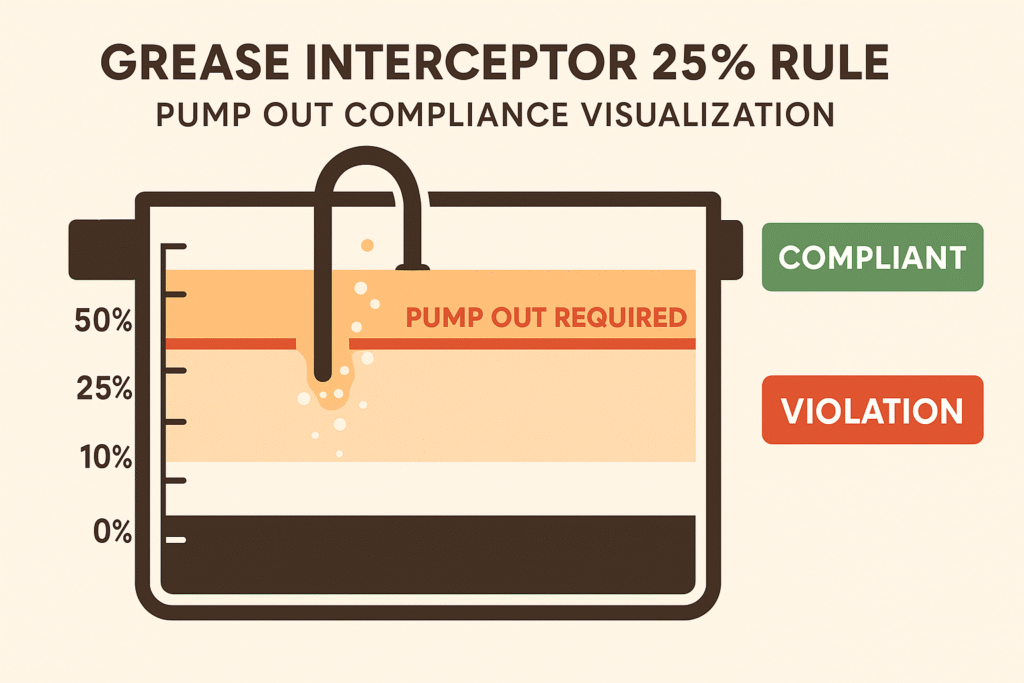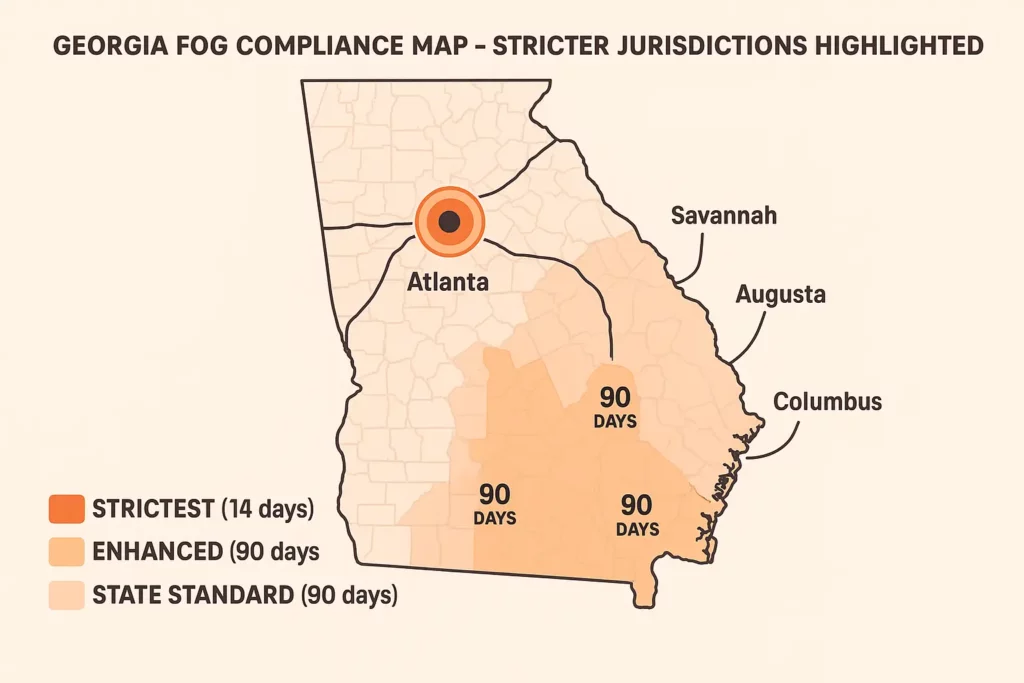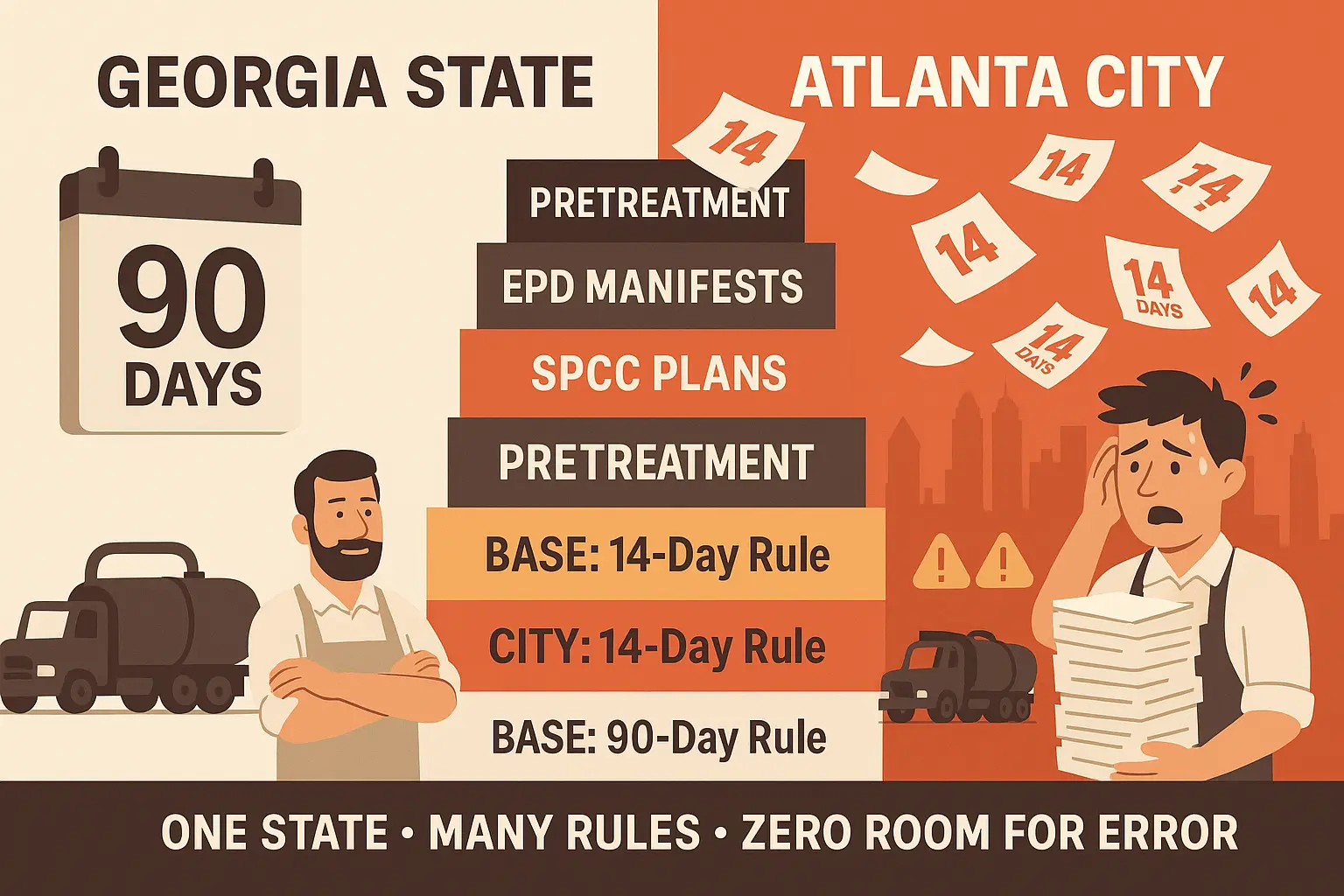Georgia’s baseline grease rule gives restaurants ninety days between pump outs, yet Atlanta cuts that window to fourteen; add SPCC spill planning, EPD manifest checks, and pretreatment limits, and the gap between state and city compliance is wider than most owners realize. This guide untangles every layer state statute, city ordinance, and federal overlay so operators can move from guesswork to inspection ready.
Table of Contents
Why Overflow Costs More Than Food Waste
A single backup can shutter a kitchen, but the bill really spikes when inspectors trace the clog to an overdue trap: Georgia fines illegal dumpers under O.C.G.A. § 16 7 52 while courts can add aggravated misdemeanor penalties that top $25,000 per day. Atlanta layers civil recovery fees for sewer blockages on top of state charges. Chefs tell us the fear isn’t the ticket it’s the Friday night crowd they have to turn away while plumbers bail sludge. That moment is when owners realize grease isn’t trash; it’s risk capital.

Georgia Baseline: 90 Day Pump Out & “No Dump” Law
Georgia adopted the International Plumbing Code’s 90 day clean out rule and the 25 percent capacity trigger, enforced during county health inspections. State Rule 391 3 6 .24 tracks every gallon of FOG from trap to disposal, and EPD cross checks manifests against pump out logs. Dumping waste oil anywhere but an authorized facility violates water quality standards and litter statutes, inviting both criminal and civil action. Most operators assume this 90 day schedule applies everywhere.
Atlanta’s FOG Ordinance: 14 Days, 250 mg/L, Stricter Fines
City Code § 154 297.03 forces indoor traps to be cleaned at least every fourteen days or sooner if the 25 percent rule is met. Discharge to sewer can’t exceed 250 mg/L of grease, a pretreatment cap monitored by Fulton County’s wastewater lab. Restaurants must submit trap drawings for approval before opening, and any remodel triggers a fresh plan review at the Department of Watershed Management. Non compliance carries daily penalties plus recovery of sewer clean out costs often dwarfing routine service fees.

SPCC & EPD: The Hidden Compliance Layer Most Kitchens Miss
While SPCC plans are famous in fuel depots, EPA guidance also flags cooking oil tanks over 1,320 gallons aggregate; many buffets breach that threshold after expansion. Georgia EPD treats large grease tanks as “industrial oil” sources and may require secondary containment that meets Rule 391 3 6 water quality goals. Ignoring SPCC doesn’t just risk fines; an uncontained spill voids insurance faster than a fryer empties.
Regional Snapshot: How Other Georgia Cities Compare
| City | Minimum Pump Out | Extra Requirements |
|---|---|---|
| Savannah | 90 days or 25 % capacity | Must meet city interceptor standards; enforcement via pretreatment ordinance |
| Augusta | 90 days; schematic drawings required for new installs | Pretreatment plan submission and on site records |
| Macon | Follows 90 day state rule; publishes hauler list for manifest audit | Hauler must report volumes to MWA |
| Columbus | Requires traps/interceptors sized to prevent any FOG discharge; frequency set by inspector | Penalties start at $100 per device |
| Forsyth Co. | 90 day mandatory pump out across all establishments | Director may order shorter intervals after violation |
| Richmond Hill | 90 day for in ground; weekly for under sink traps | Chemical emulsifiers banned |
A Chef Friendly Roadmap to Zero Penalty Compliance
Start with a compliance calendar: mark state mandated 90 day deadlines, then overlay Atlanta’s 14 day cycle if you cook inside the perimeter. Keep pump out manifests for three years; EPD inspectors request them first. Install a dipstick or remote sensor so staff can log grease depth each Friday an action that takes forty seconds and prevents weekend backups. Draft an SPCC addendum if your total oil storage tops 1,320 gallons; EPA doesn’t require you to file it, but you must keep the signed plan on site. Finally, review Fulton County’s 250 mg/L pretreatment cap before changing dish soap; some degreasers spike lab readings and trigger violations.
From Confusion to Confidence: Grease Connections Advises
Most owners hesitate at extra pump outs; they picture lost prep time and surprise invoices. Yet the “aha” moment comes when they see city fines can eclipse a year of proactive service. Grease Connections advises scheduling fourteen day indoor cleans and 90 day interceptors in a single early morning visit so the fryers heat on time and the inspector’s clipboard stays blank. For location specific tips, see our Atlanta grease guide.









